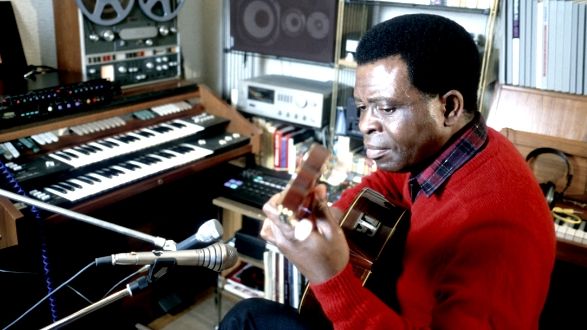There is an assumption that much of African music is rooted in centuries-old folk traditions and archaic instrumentation. While this hypothesis is largely rooted in racism and xenophobia, it is certainly true that many prominent African musicians – particularly relating to styles like Fuji music, hailing from West Africa, are built upon traditional music. The vast continent of Africa has had its fair share of musical innovation, too. Perhaps the most prominent example of this musical futurism comes in the form of the Cameroonian composer Francis Bebey.
During the late 1950s, a time in which many Cameroonian artists were utilising traditional instruments exclusively, Francis Bebey was looking towards the future in the run-up to the country’s independence from France in 1960. From his adopted home in Paris, he started using early synthesisers, drum machines and keyboards to create his unique sound. Not only was Bebey the first African musician to adopt electronic music, but he was among the first pioneers of electronic music worldwide, operating years ahead of German electronic outfit Kraftwerk or the Nigerian synth-master William Onyeabor.

Bebey was a self-sustaining musical maestro, recording all his own work in an improvised studio in his Paris apartment and overdubbing the instruments independently. He was an archetypal innovator, operating decades ahead of his time. However, Bebey certainly was not one to turn his back on the musical history of his native land. A large part of what made his work so enjoyable was that it simultaneously celebrated the folk traditions of Cameroon while dragging them firmly into the modern musical age with the aid of electronic music.
The unique blending of Cameroonian influences with European electronica proved controversial at the time, with mainstream audiences in the 1960s not endearing themselves towards the futuristic folk stylings of Bebey. But, in the words of Marty McFly, “I guess you guys aren’t ready for that yet, but your kids are going to love it.” From his first official releases in the ’60s, the composer went on to release over 20 albums well into the 1990s.
It was not until relatively recently that Bebey started to gain the recognition he so richly deserved. Part of that long-awaited resurgence in popularity came from compilations released by the Parisian record label Born Bad Records, which sought to chronicle the development of African electronic music.
During a 1982 interview with Chris May, Bebey revealed his artistic manifesto, saying, “What I’m aiming to do is to use Western technology to invigorate African music and spread its message internationally.” Throughout his career, he certainly achieved that aim. The cross-continental influences set him apart from virtually every other musician in operation at the time.
Tragically, Bebey passed away in his Paris home in 2001, not living long enough to see his incredible body of work hailed for its innovative genius and revolutionary music techniques. Nevertheless, the composer certainly lives on through his music, which continues to be rejoiced today by audiences across the entire globe.
 CameroonOnline.org Cameroon news, Actualité Camerounaise, live Web TV & Radio, World News and a lot more
CameroonOnline.org Cameroon news, Actualité Camerounaise, live Web TV & Radio, World News and a lot more
